VJ Day Celebration on Flagler Street
On the 80th anniversary of V-J Day, we look back on how the naval servicemen and Miami residents celebrated the news of the surrender of Japan marking the end of World War II.
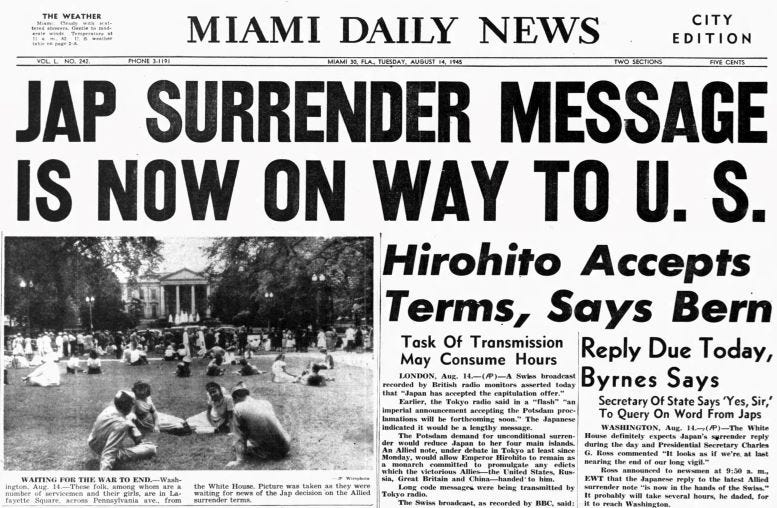
It was an 83-degree temperate afternoon in downtown Miami on August 14, 1945, at 2pm EDT. The City of Miami was crowded with naval serviceman and had been since a few months after the bombing of Pearl Harbor in December 1941. The Navy took over the city and established their Southern Command at the Alfred I Dupont building, which was dubbed USS Neversink because it would never have to endure battle on the high seas. The city’s hotels became naval barracks, and the roads and parks became training ground for those servicemen who would eventually be deployed to the Pacific theater of war.
Residents and naval personnel were going about their business when breaking news had begun to circulate among those who found themselves in the heart of Miami’s commercial district on that day. As the City Edition of the Miami News hit the stands at 2pm, local radio stations began to share the bulletin that Japan had surrendered, and the war was unofficially over. The official end to the war would occur on September 2, 1945, when Japan formally surrendered to the Allied Powers.
In an instant, routine errands gave way to jubilant celebration, marking the end of America’s five-year involvement in World War II. Among those swept up in the moment was one naval serviceman, whose memory of that day still lingers.
Sailor Shares What Happened on Flagler Street
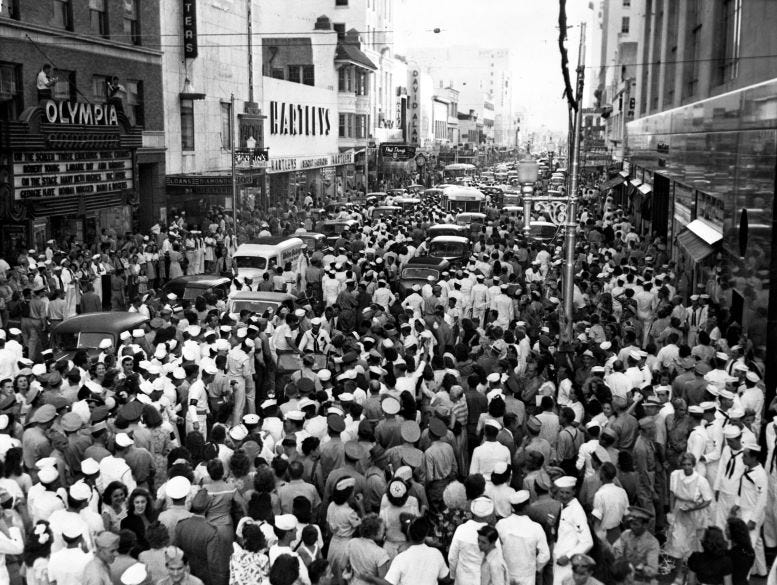
Below was an account by unnamed serviceman who shared his story of what he did after hearing about Japan’s surrender on August 14, 1945, as published in the Miami Herald.
“The first hour after peace broke out Tuesday was tough duty. I was on Flagler soon after the word came through, and went into a store. A girl working in there said, ‘I am going to kiss the first serviceman I catch on the outside so hard he’ll never forget it.’ I will be waiting behind the first door on the right, I said. She came out and did.
Somehow, I lost track of her after that, and walked down the street. I ran into a shipmate out in the middle who was carrying a big American flag and bucking the traffic. I joined up with him and the four or five others in line. Pretty soon there were hundreds of sailors and soldiers and girls behind us, and we had the traffic licked to a standstill. The cops had to guide it into the side streets.
We sang Glory, Glory Halleluiah and some other songs, and then I decided to knock off the parading and see what was going on elsewhere. I joined up with some Chinese sailors and asked one of them How’s it going, mate? ‘I am the happiest moment of this life,’ he said. That’s putting it just right, I told him.
The Chinese Navy got hold of a convertible coupe somewhere, and piled all over it, driving up and down Flagler waving the Chinese flag. I went up to the duPont building on my own again. On my way, I noticed that my old paly with the big American flag was still leading a parade along the street, except it was longer now and there were more girls and kids in it. Some of the sailors were carrying the girls on their shoulders.
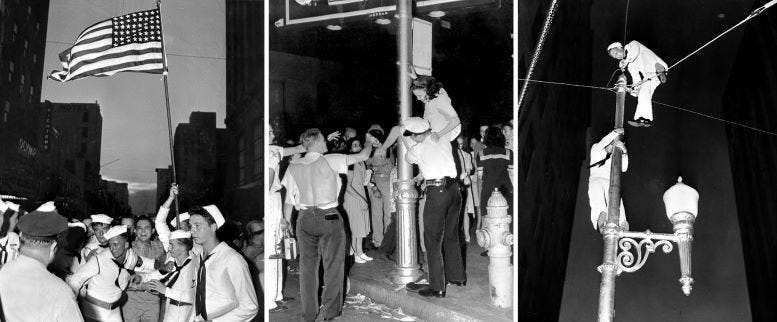
Just then the crowd began jostling me hard and a young woman grabbed my hand. She looked around and blushed. She’d been reaching for her escort who was stranded somewhere behind me. Well, I finally got to the duPont building where the largest crowd of all was located. The traffic wasn’t running past there at all, and the streets and sidewalks were jammed full of people. A middle-aged woman standing beside me grabbed me by the shoulder. ‘Thank God,’ she said, ‘thank God you boys won’t have to go to sea any more. You won’t even have to listen to the SPs now.’ Amen, I said.
I wandered on, and before I knew it, I was all tangled up in the ticker tape and confetti floating down from the duPont. While I was unraveling myself I bumped into a big guy I couldn’t see, and was just about to tell him to watch his step when I noticed he was full of gold braid, with scrambled eggs all over his hat.
Sir, I said, I am sorry, I should have watched my step. He replied, ‘forget it, and congratulations.’ After that I needed a cigarette, so I popped a couple of dimes into the first machine I ran into. The cigarettes came out, and there were my two dimes beside the pack. You couldn’t lose last night. As I say, it was tough duty.”
Celebration Throughout South Florida
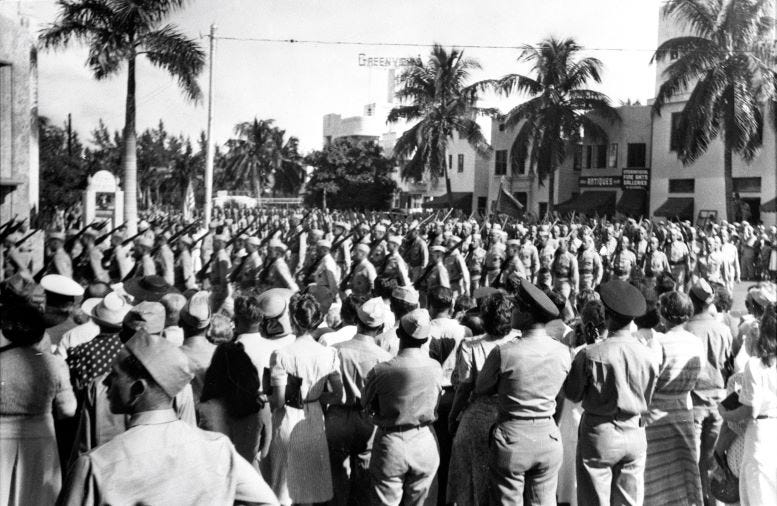
In addition to the jubilant and raucous celebration on Flagler Street, particularly near the intersection of East Second Avenue where the Navy’s Southern Command center was located, there were spontaneous celebrations that broke out all over South Florida, as well as throughout the country. The Army Air Corp was based on Miami Beach and soldiers congregated on Lincoln Road after hearing the great news that the war was coming to an end.
However, the biggest celebration occurred in the heart of downtown Miami’s most important street. Jack Thale of the Miami Herald wrote about the celebration and the size of the crowd that flooded downtown Miami:
“Crowds that within an hour mounted to at least 10,000 and were swelling hourly screamed themselves hoarse, jammed downtown streets from curb to curb, carpeted the town in confetti and ticker tape, tied down their auto horns and blasted gloom to the winds.”
At the peak of the celebration, estimated to have occurred between 9 and 10pm, 30,000 people jammed into the midtown area along Flagler Street. The celebration continued until about midnight when people began returning home to wind down this historic day.
Chief of police, H. Leslie Quigg, said that, despite the large crowds, there were very few incidents. He stated that “things went unusually well. There were a few fights, a minimum of accidents, and no more drunkenness than normally could be expected.”
Miami Beach Police Chief, Albert Simpson, said that the island quieted down quickly after the first wave of jubilance. Governor Millard Caldwell announced a statewide V-J liquor ban that began at 7pm on August 14, and was lifted 24 hours later. The military police, some 300 in total, shut down all bars and liquor stores within 30 minutes of the surrender report.
In the end, this historic day was celebrated in as civil a manner as could be expected given what it meant to an entire generation of people. One can only imagine what those who were stationed, or lived, in Miami during this time felt hearing the news of the end of the war. It must have been a tremendous relief knowing that so much sacrifice was giving way to what many believed was a promising future full of endless possibilities.
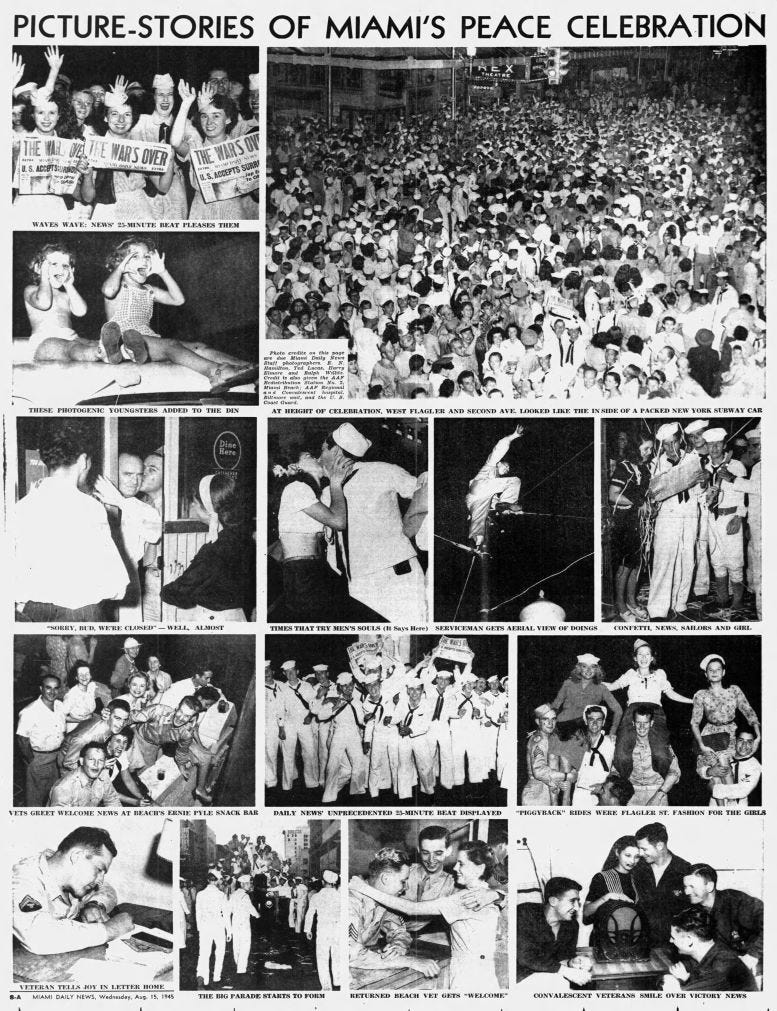
Related:
Podcast: “Greater Miami During WWII”.
Resources:
Miami Herald: “Jap Surrender Message is Now on Way to U.S.”, August 14, 1945.
Miami Herald: “Downtown Crowds Orderly Through Long Celebration”, August 15, 1945.
Miami Herald: “Miami V-J Day Crowds Tear Lid Off the Town”, August 15, 1945.
Miami Herald: “Sailor Tells What Happened on Flagler Street”, August 15, 1945.



What a beautiful story. It made my heart swell.
Wonderful, vivid descriptions. I'm curious also about celebrations that may have taken place in Overtown and within the Black community. (The Miami Times archives in the University of Florida database go back only to 1948, but there might be more places to look.)